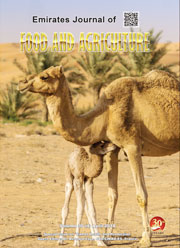RAPID IN VITRO REGENERATION OF DATE PALM (PHOENIX DACTYLIFERA L.) CV. KHENEIZI USING TENDER LEAF EXPLANT
DOI:
https://doi.org/10.9755/ejfa.v26i6.18051Keywords:
Micropropagation, Somatic embryogenesis, Regeneration, Tender leaf base explant, KheneiziAbstract
Somatic embryogenesis has been accomplished from tender leaf base explant of date palm (Phoenix dactylifera L.). Three to five mm long tender leaf base explants derived from the meristamatic region of 2-3 year old offshoots of date palm cv. Kheneizi were cultured on Murashige and Skoog (MS) basal medium supplemented with 10, 50, 100 and 150 mg l-1 2,4-dichlorophenoxy acetic acid (2,4-D) and incubated in dark for 6 weeks to initiate callus. Callogenesis was obtained in all 2,4-D concentrations tested; however, callus growth was most significant in media supplemented with 100 mg l-1 2,4-D. The leaf explants with callus were transferred to hormone-free MS medium for 4 weeks and then further sub-cultured to a medium supplemented with 0.5 mg l-1 ?-naphthalene acetic acid (NAA) and 0.25 mg l-1 6-benzyl amino purine (BAP) which was effective in inducing shoot and root primordia within 10 weeks. In another 12 weeks, two more sub-culturing of shoot clumps in the same medium resulted in the development of shoot with roots and gave whole plants by 8 weeks. The plantlets were hardened and acclimatized to the ambient conditions and planted in pots, containing 1:1:1 peat, sand and dehydrated cow manure, which resulted in over 60% ex vitro plant survival. Early plant regeneration was achieved by this technique.










 .
. 